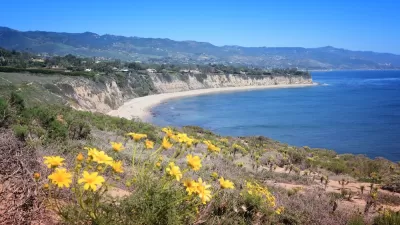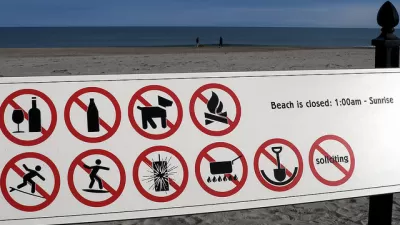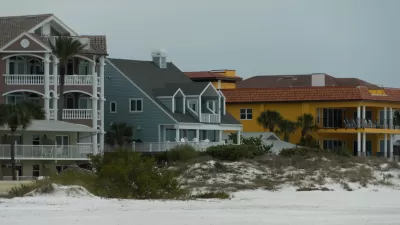It's harder to access the ocean in Massachusetts than any other coastal state in the country, but that could soon change.

"Thanks to a well-meaning ordinance approved by the king of England in the 1600s, modern Massachusetts (as well as Maine, due to the fact that it was once part of Massachusetts) today has what are considered the most restrictive ocean access laws in the country," according to a paywalled article by Billy Baker. The law was one of the first to fracture the Public Trust Doctrine first expressed in Roman law and passed down through millennia until it came to Massachusetts.
That could change soon, however, after state legislators proposed a new law that hinges on a single word: recreation. Baker explains more:
Under the Massachusetts interpretation of the Public Trust Doctrine, a state law known as Chapter 91, the public can access “private tidelands’’ for only three purposes: “fishing, fowling, and navigation.’’ When it was formalized in 1866, Chapter 91 was meant to protect how the public customarily used the sea.
State Senator Julian Cyr and State Representative Dylan Fernandes are proposing that the Chapter 91 be rewritten to add recreation to the "fishing, fowling, and navigation" protections in Chapter 91, as Baker explains in the article.
Experts and stakeholders on either side of the issue present their case in the remainder of the article. One key consideration in the debate is climate change, and the public assistance some coastal landowners, who might be resistant to the proposed law, will require to deal with the effects of sea-level rise.
FULL STORY: Here’s the word: ‘Recreation’ could open up beach access

Planetizen Federal Action Tracker
A weekly monitor of how Trump’s orders and actions are impacting planners and planning in America.

Maui's Vacation Rental Debate Turns Ugly
Verbal attacks, misinformation campaigns and fistfights plague a high-stakes debate to convert thousands of vacation rentals into long-term housing.

Restaurant Patios Were a Pandemic Win — Why Were They so Hard to Keep?
Social distancing requirements and changes in travel patterns prompted cities to pilot new uses for street and sidewalk space. Then it got complicated.

In California Battle of Housing vs. Environment, Housing Just Won
A new state law significantly limits the power of CEQA, an environmental review law that served as a powerful tool for blocking new development.

Boulder Eliminates Parking Minimums Citywide
Officials estimate the cost of building a single underground parking space at up to $100,000.

Orange County, Florida Adopts Largest US “Sprawl Repair” Code
The ‘Orange Code’ seeks to rectify decades of sprawl-inducing, car-oriented development.
Urban Design for Planners 1: Software Tools
This six-course series explores essential urban design concepts using open source software and equips planners with the tools they need to participate fully in the urban design process.
Planning for Universal Design
Learn the tools for implementing Universal Design in planning regulations.
Heyer Gruel & Associates PA
JM Goldson LLC
Custer County Colorado
City of Camden Redevelopment Agency
City of Astoria
Transportation Research & Education Center (TREC) at Portland State University
Jefferson Parish Government
Camden Redevelopment Agency
City of Claremont





























